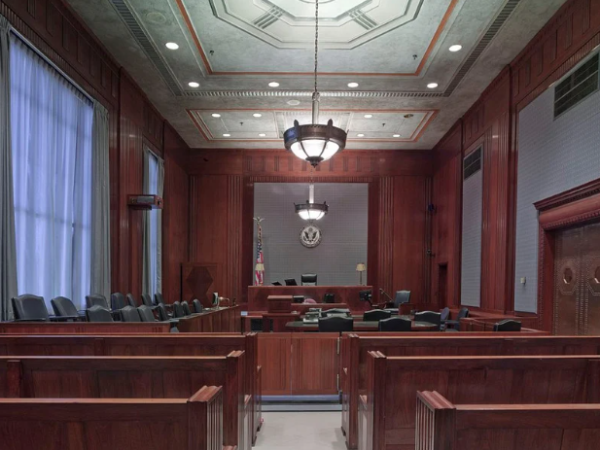
Content Warning: This article mentions sexual assault and sexual violence towards minors and adults.
Family man. Philanthropist. Icon. All words used by Sean “Diddy” Combs’ legal team to describe him in a statement released on Sept. 16, 2024, the day of his arrest. Since Sept. 16, Diddy has had over a dozen lawsuits filed against him, his victims including underage men and women, according to the BBC. Statements like the one from his legal team are an attempt to downplay the facts — that he is a man with a tremendous amount of power who repeatedly used that power to commit sex crimes. Pointing to a man’s family and career as a sign of their innocence isn’t a new defense, and it shouldn’t be exonerating.
Cambridge Dictionary defines culpability as “the fact that someone deserves to be blamed or considered responsible for something bad.” The idea that powerful men deserve to have consequences for their actions is not revolutionary, but said consequences are rare. However, in the past decade, some changes have begun to occur. On Oct. 5, 2017, two New York Times journalists, Jodi Kantor and Megan Twohey, published a story on Hollywood producer Harvey Weinstein, reporting that he had reached legal settlements with several women in order to hide his abuse and prevent them from speaking about it. The New Yorker came out with more allegations against Weinstein five days later. #MeToo, a social movement against sexual violence and sexual assault, was founded in 2006 by Tarana Burke, but the use of it as a hashtag went viral in October 2017. Used by millions of women who shared their experiences online, it brought a sense of solidarity to what can be isolating experiences, and introduced them to the forefront of public consciousness, displaying the magnitude of the issue.
The #MeToo movement seems to have shifted public perception. In 2022, the Pew Research Center reported that seven–in–10 U.S. adults believe that those who commit acts of sexual harassment or assault in the workplace are more likely to be held responsible for their actions than they were five years earlier. The same study showed that twice as many Americans support the #MeToo movement rather than oppose it.
In 2024, has this shifted sentiment resulted in society holding powerful men accountable for their actions? Accountability looks different in every situation, but for the criminal actions of a powerful man, it generally involves a combination of legal, financial, and social consequences, all of which are meaningful in different ways.
Legal consequences, while important, are not guaranteed. In a criminal case, the burden of proof makes obtaining a guilty verdict challenging. While all trials involve optics — suits, fresh haircuts, good manners — sexual assault cases can highlight the negative aspects of appearances. Lines of questioning are often focused on the victim: “What were you wearing?” “Did you know the person?” “Did you encourage them?” “Did you upset them?” and “Did you resist?” In a trial by jury, nine people will decide the innocence — or guilt — of those involved. This system is never a neutral one. Humans are shaped by bias, and swayed by the opinions of others. “The public’s perception and understanding of what sexual assault and harassment could or should look like, as opposed to what it does look like, can play a role,” said Ashley Vaughn, an attorney at Dumas and Vaughn.
The way a person is perceived by a jury and by the media can influence legal proceedings, as was seen in the Depp v. Heard case. Johnny Depp became a household name in the ‘90s, and his role as Captain Jack Sparrow in the Pirates of the Caribbean franchise made him a box-office success. Depp married Amber Heard, an actress and activist, in 2015, and they were together for two years before divorcing. In 2018, Heard wrote an editorial for the Washington Post discussing her experiences with domestic abuse. Though she never named Depp, he sued her for defamation. Their trial was recorded, and support was overwhelmingly directed towards Depp, with #JusticeForJohnnyDepp and #AmberTurd trending on social media, according to NBC news.
The Depp v. Heard trial was complicated, and it became clear to the public that there was fault on both sides. Even if one doesn’t like her, trust her, or believe her, the way Heard was treated is not acceptable. The way she was spoken about shows the dark side of societal fascination with celebrity cases. Publicity can be weaponized. It can turn what should be a serious proceeding into a global event, and it can complicate the idea of a fair trial. Mary Sofia, a solo practitioner at a small law firm, stated, “I don’t think the reporting is as nuanced as it could be.” All parties deserve due process; without it, the justice system is not just. Allegations of sexual abuse and assault can be ruinous to someone’s reputation, career, or life. This is exactly why these allegations need to be taken seriously. Though someone’s greatest wrongs are not the sum of their character, their bad actions should factor into society’s estimation of them in the same way their accomplishments do. Repercussions should reflect the severity of behavior.
Laws are still catching up. “Consent is a lot more nuanced of an issue than the law treats it, and it can be more complicated,” said Vaughn. “It can look different, depending on power dynamics, depending on ages, depending on gender.” Financial consequences do not solve problems but may be helpful for victims. Vaughn stated, “I think for the victim, the process often doesn’t give them the closure or the sense of justice that they’re seeking. That comes with time, being able to find some good mental health resources, and having a really good support network.” Although the money itself will not change the events, it can help the people harmfully impacted to financially recover and access resources.
Social accountability is incredibly important. Powerful men, whether through their work, art, or accomplishments, are often still admired after their character is revealed. Woody Allen’s adoptive daughter, Dylan Farrow, wrote a powerful letter that was published in the New York Times, in which she detailed Allen’s sexual assault when she was seven years old, calling out celebrities by name who knew her as a child and turned a blind eye to her abuse. At the end of her piece, she stated, “Woody Allen is a living testament to the way our society fails the survivors of sexual assault and abuse.”
Over the years, people like Farrow have seen the men who hurt them lauded and exalted by the country. Red flags ignored, incidents covered up, and victims silenced. Power and status often seem to come with a shield from consequences. Sara, an Oregon resident, expanded on this when asked what true accountability would look like to her, saying, “Some way of preventing them from using their power to do more harm. Whether that’s prison or something else, but actionable.”
Once someone has continually said offensive things, or been repeatedly accused of assault, it can seem like the standard of behavior is lowered. What once caused outrage will just be met with apathy. “It doesn’t seem as shocking when men are accused,” said Christina, an Oregon resident, adding, “All these people you kind of looked up to, or actors you thought were great artists, or funny comedians. And for me, it feels like you can’t really trust anybody, or look up to anybody.”
The enormity of the problem can feel exhausting. At times, it feels like nothing has changed. Woody Allen was awarded a lifetime achievement award. Harvey Weinstein is still a multi-millionaire. People still watch their films, listen to their music, and applaud their achievements. Despite this, there are signs that our standards are moving in the right direction. Though many have joked about Diddy’s case, the courts have taken the charges very seriously, refusing to let him pay bail, instead detaining him in a Brooklyn jail.
“Good accountability should be focused on what the harmed party wants, what makes them whole, and also what helps the accused do their best to make restitution,” Sofia said, hopeful that the legal process will continue trying to focus on the people affected. Often, a man’s reputation may seem tainted, yet somehow not ruined. As individuals, it’s important to evaluate our own biases and draw a clear line for what is unacceptable behavior. Those in power should not be idolized to the degree that their actions go uncondemned, and their accomplishments should never be more important than recognizing and supporting the people they have victimized.



































M. Westfield • Oct 30, 2024 at 8:02 pm
This is a remarkable piece. What makes this analysis so compelling is its attention to the subtleties of justice—the role of optics in the courtroom, the biased scrutiny placed on victims, and the intricate dance between legal, financial, and social consequences. The narrative deftly illustrates the tension between the vastness of the problem and the small, yet significant, shifts in societal expectations that hint at progress. This isn’t merely a recounting of facts; it’s a thought-provoking dissection of the moral and ethical questions society faces as it attempts to hold those in power to account.